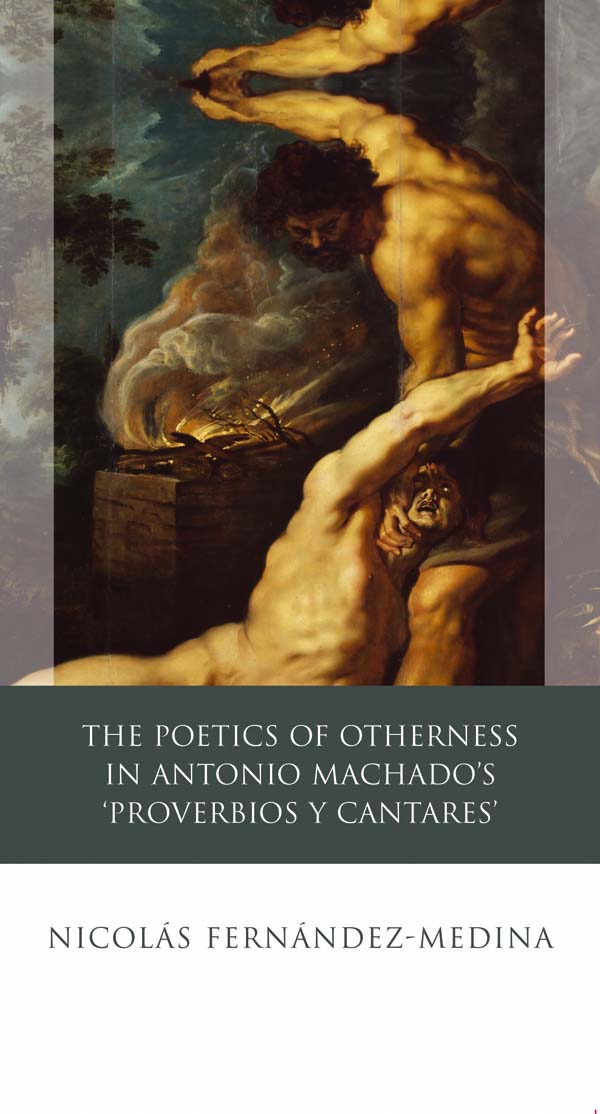The Poetics of Otherness in Antonio Machado's 'proverbios Y Cantares'
Author(s) Nicolás Fernández-Medina
Language: English
Genre(s): Modern Languages
Series: Iberian and Latin American Studies
- January 2011 · 240 pages ·216x138mm
- · Hardback - 9780708323229
- · eBook - pdf - 9780708323236
- · eBook - epub - 9781783164356
Antonio Machado (1875-1939) is one of Spain’s most original and renowned twentieth-century poets and thinkers. From his early poems in Soledades. Galerías. Otros poemas of 1907, to the writings of his alter-ego Juan de Mairena of the 1930s, Machado endeavoured to explain how the Other became a concern for the self. In The Poetics of Otherness in Antonio Machado’s “Proverbios y cantares,” Nicolás Fernández-Medina examines how Machado’s “Proverbios y cantares,” a collection of short, proverbial poems spanning from 1909 to 1937, reveal some of the poet’s deepest concerns regarding the self-Other relationship. To appreciate Machado’s organizing concept of otherness in the “Proverbios y cantares,” Fernández-Medina argues how it must be contextualized in relation to the underlying Romantic concerns that Machado struggled with throughout most of his oeuvre, such as autonomy, solipsism and skepticism of absolutes. In The Poetics of Otherness in Antonio Machado’s “Proverbios y cantares,” Fernández-Medina demonstrates how Machado continues a practice of “fragment thinking” to meld the poetic and the philosophical, the part and whole, and the finite and infinite to bring light to the complexities of the self-Other relationship and its relevance in discussions of social and ethical improvement in early twentieth-century Spain.
“This handsome, hardback tome, with its most appropriate and sumptuous front cover depicting Rubens' Cain Slaying Abel sets matters right [on Machado's 'Proverbios y cantares'] . . . This splendid book . . . shows that the finite inquiry into the works of Antonio Machado is far from being exhausted. This text is a serious and welcome contribution to that process.”
(Philip G. Johnston, University College Dublin)
“Fernández-Medina's thorough and well-researched study places the spotlight on a largely unexplored facet and corpus of Antonio Machado's poetic production, namely his shorter, more proverbial texts . . . [The Poetics of Otherness] will surely be an excellent resource for students and scholars of Spanish literature as well as those interested in gaining a thorough understanding of the philosophical, intellectual and social climate in which Machado wrote his poetry.”
(Paul H. Cahill, Pomona College)
“En la copiosísima bibliografía sobre la obra de Antonio Machado, ‘Proverbios y cantares’ es, con diferencia, la parte menos estudiada. De ahí que el presente estudio sea una contribución que se suma a los escasos trabajos, algunos recientes. . . con el propósito de corregir esta laguna. . . Acierta [Fernández-Medina] en aproximarse a los 'Proverbios y cantares' interesándose por el problema del otro.”
(Reyes Vila-Belda, Indiana University)
“In this essential and illuminating book on Antonio Machado’s “Proverbios y cantares,” Nicolás Fernández-Medina provides us with an in-depth and systematic study of what has been, with a few notable exceptions, a poorly understood corpus of the poet's creative and meditative work . . . Fernández-Medina provides a deeper understanding of important recurring themes in the poet’s work: solipsism, how to know the self and the ‘real’ Other, the problematic search for God, skepticism in the face of absolutes. This densely rich study is contextualized as well with reference to Machado’s formative years . . . all leading to the transition from an early symbolist and modernista sensibility. Of particular interest, at the end of this splendid contribution to Machado studies, is to learn the degree to which Machado’s exploration of the experience of otherness anticipated some of the major philosophical discoveries of the twentieth century.”
(Michael Predmore, Stanford University)
“El combinar la precisión del objeto con la amplitud del marco es uno de los principales méritos de este trabajo, y hace recomendable su lectura para quienquiera que se interese no solamente por Machado, su poesía y su poética, sino también por el problemático ajuste de la cultura española a la Modernidad occidental . . . [Q]uien tenga un interés general por la poética de Machado y por las relaciones entre la poesía, el pensamiento, y la historia contemporánea, encontrará en The Poetics of Otherness de Fernández-Medina una valiosa introducción plena de orientaciones y estímulos.”
(Luis Galván, Universidad de Navarra)
INTRODUCTION Beyond the Lyrical and the Proverbial: Antonio Machado's Poetic Thinking I. THE PROBLEM OF SUBJECTIVITY: HOW TO KNOW THE SELF AND OTHER Kantian Metaphysics and the Need for Realness The Rise of Individualism Reading the Fragment, Reading the Whole: Poetry's Becoming The 'proverbio' and 'cantar': A Brief Genealogy II. TOWARDS CONCEIVING THE OTHER: THE FORMATIVE YEARS The Machado Family The Institucion Libre de Ensenanza and the Krausist 'hombre' The Madrid Years: Folk Poetry in the Age of Romantic Exhaustion The Influence of Eduardo Benot Early Poetic Symbolism: The Soledades III. FROM ART TO LIFE: CRITICAL INQUIRIES AND A NEW POETRY The Machado-Unamuno Correspondence 1903-1905 The modernismo Question Cain, Abel and the Thirsting Brother Poetic Inspiration: The Honey Bee IV. THE GOD OF INTERSUBJECTIVITY Spain's Spiritual Crisis and Unamuno's Lessons on God The Janus-faced God: Presence and Absence The Divine Light Within: Machado's Critique of Organized Religion Jesus as Symbol V. THE DOUBLE BIND OF KNOWLEDGE AND IGNORANCE Ignorance and Spain's 'problema de cultura' The Problem of Empty-Headedness Cucana Logic The Collective Meaning of 'saber' The Infinity of Knowledge and Ignorance CONCLUSION The Infinite Inquiry Machado's Trajectory Toward Otherness From Machado to Levinas


